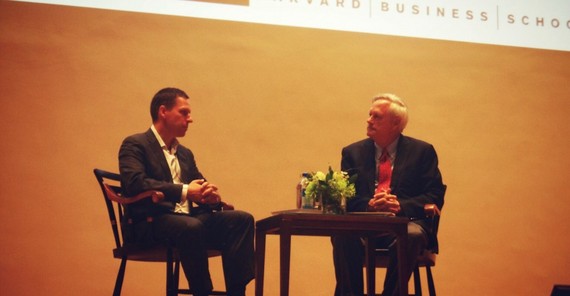"Definite optimism works when you build the future you envision."
Peter Thiel
There are a few things better than a good conversation, but not many. A good conversation inspires you to think differently. It keeps you engaged long after the conversation has ended. When Peter Thiel, co-founder of PayPal and Palantir, visited Harvard Business School last week, his fireside chat with Bill Sahlman, Class of 1955 Professor of Business Administration, was of such caliber.
After the conversation, I looked at students eagerly waiting in line and Thiel patiently signing copies of his book. I kept thinking about what he said. "The value of failure is greatly overrated," he insisted. "The belief that it is hard but possible is a very effective truth," he said.
It felt like meeting Charles Xavier, the fictional superhero also known as Professor X. Although Thiel is not training mutants, he is training us to think different. He is training us to challenge conventional wisdom.
He explained that capitalism and competition are antonyms, and not synonyms. He urged students to avoid excess competition. He told us why he is against hiring a CEO. Unlike founders they lack strong views. What's more he said that we put too much emphasis on luck or chance. In fact, ascribing things to chance is symptomatic of being lazy, he said.
If you thought deeply about what he said, you realized that his talk was not just about startups. It was about how to think about the future. There were many things that one could spend an entire essay on discussing. What stood out the most, however, was his discussion of the definite optimist.
A definite optimist has conviction about the future. In Thiel's words, a definite optimist is someone to whom the future will be better than the present if he plans and works to make it better. It is about striving to implement a vision. It means shaping and influencing the future. Therefore, to be a definite optimist includes finding one thing you are good at and becoming great at it.
The indefinite optimist, in contrast, believes that things are not determined by cause and effect. The indefinite optimist is governed by a belief in randomness. He lacks conviction and pursues less ambituous goals.
That's why Thiel likes "mission-oriented" companies. Steve Jobs had that mission for Apple and carefully planned and executed on his vision. Elon Musk has that mission with SpaceX (making life multi-plenatory) and Tesla (accelerating the advent of sustaintable transportation.) Those entrepreneurs understand complex coordination, Thiel said, and they take different pieces and put them together in the right way.
Remember Thiel's concept of the definite optimist. It is not enough to be an optimist. You need to think about the future in a definite manner. That does not mean that everything you plan will work out. It is easier said than done. But being a definite optimist is the first step to be in control of your destiny.
This was originally published at The Harbus, the student newspaper of the Harvard Business School.

